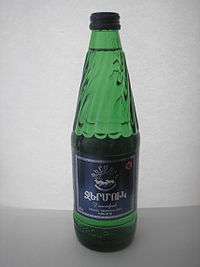Jermuk (water)
 Jermuk mineral water from Vayots Dzor, Armenia | |
| Type | Mineral water |
|---|---|
| Manufacturer |
Jermuk Group, Armenia Official site: |
| Country of origin | Jermuk, Vayots Dzor, Armenia |
| Introduced | 1951 |
| Variants | Jermuk Classic, Jermuk low-carbonated, Jermuk-Vayots Dzor |
| Website | www.jermukgroup.am |
Jermuk (Armenian: Ջերմուկ) is a bottled mineral water originating from the town of Jermuk in Armenia, and bottled since 1951.
History
Jermuk mineral water has been used for its medicinal properties since centuries, as is clear from primitive stone basins, one of which has survived as a reminder of the past. Jermuk was first mentioned in writing in 189 AD, when Jermuk fortress was built, with the eponymous town being founded some time later. According to historical records, Jermuk was the summer residence of the Armenian princes of the neighbouring province of Syunik.
The first surveys of the area around Jermuk (including the composition and properties of its mineral waters) were made in 1830 by the Russian geologist and engineer G. Dzoyokoyev-Boykikov; these did not result in the commercial exploitation of "Jermuk" mineral water, however. Only in 1925-1935 did well-known scientists like V. Alexandrov S. Nalbandov, V. Dikin and A. Melik-Aramyan and others subject Jermuk's mineral waters to scientific examination, in the process confirming its unquestionable medicinal properties. In 1945 the Soviet government took the decision to turn Jermuk town into a health resort of nationwide significance, in view of the mineral water's extraordinary healing properties. By the 1970s the visitors to Jermuk's sanatoria numbered 25-30,000 people yearly.
Features
In its chemical composition, it is similar to the waters of Jeleznovodsk and Karlovy Vary, but in its taste it has no equal.
Production is organized in the town of Jermuk itself, at source nr. 30/62, from where both Jermuk mineral water and natural carbon dioxide gas enter the factory's production cycle and are bottled and packaged using the latest automated technology. The constantly high quality of Jermuk mineral water is assured by the use of contemporary machinery, through the efforts of capable experts, and thanks to the continuous supervision of the factory's central laboratory. Jermuk mineral water is produced in 0.5 litre standard and company glass bottles, as well as in 0.5, 1.0 and 1.5 litre plastic (PET) bottles, all made out of materials suitable for foodstuffs and hermetically sealed. Its expiration date is 12 months from production, provided it is stored in a cool and dark place. Jermuk mineral water has been certified by the state standards' authorities in both the Republic of Armenia and the Russian Federation, according to Armenian standard nr. 191-2000.
On a daily basis, the company's central lab supervises its microbiological purity and its chemical composition's main elements, which have to correspond to the following standard, mentioned on international labels.
Chemical composition:
- Ca=200
- Mg=50-80
- Na+K=900-1100
- HCO3=1800-2150
- SO4=630-780
- Cl=300-360
- Total Mineralization=3900-4800
Packaging
Jermuk mineral water various packaging:
- 1.5 litre, polyethylene bottle
- 1.0 litre, polyethylene bottle
- 0.5 litre, polyethylene bottle
- 0.33 litre, polyethylene bottle
- 0.5 litre, glass bottle
FDA warning
May 31, 2007: the U.S. Food and Drug Administration (FDA) is warning consumers in the West Chester, Pennsylvania area not to drink any Jermuk brand mineral water due to the risk of exposure to arsenic, a toxic substance and a know cause of cancer in humans. Jermuk Classic Medicinal Table Natural Sparkling Mineral Water in 0.5 liter green translucent glass bottles under the Jermuk Group brand label was recalled on 5/1/07 by AA Impex Group, Philadelphia, PA. Approximately, 200 bottles of the product were sold at the Great Pumpkin Corporation, 607 East Market Street, West Chester, PA, a retail store. FDA has sampled the product and found that it contains 536-539 micrograms of arsenic per liter of water. FDA's standard of quality for bottled water allows no more than 10 micrograms per liter. Product can be returned to the Great Pumpkin for a refund. There have been no illnesses reported at this time. Consumers who drank this water and have concerns are encouraged to contact their health care provider.